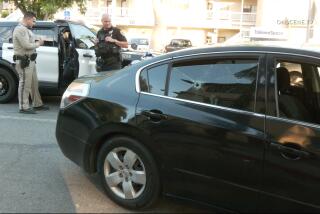Transit Board OKs Talks to Buy Private Tollway
- Share via
Trying to relieve severe congestion on the notorious Riverside Freeway, the Orange County Transportation Authority took a key step Monday toward buying the 91 Express Lanes, a privately operated toll road that runs down the middle of the highway.
Transportation leaders in Riverside and Orange counties have blamed the tollway for aggravating rush-hour congestion along the highway, one of the busiest in Southern California. Because of a deal it struck with the state years ago, the toll lanes’ owners can veto freeway widenings.
The 15-member board of the transportation authority unanimously authorized its staff to enter sales negotiations with the California Private Transportation Co., which operates the 10-mile tollway in northeast Orange County.
“This is an excellent move. We are strongly behind this,” said Irvine City Councilman Mike Ward, who chairs the transportation authority board. “You have to praise [California Private Transportation Co.] for building lanes when there was no money for freeways, but congestion has continued to worsen.”
Determining the value of the lanes is expected to be a major sticking point. Rarely, if ever, has a government entity tried to buy a private tollway.
The tollway, which opened in 1996 at a cost of $130 million, consists of two lanes in each direction extending from north Anaheim to the Riverside County line. The stretch of public highway is known for extreme bottlenecks during morning and evening rush hours.
To ensure the turnpike’s success, Caltrans and California Private Transportation entered into an agreement in the early 1990s that gives the Express Lanes veto power over improvements to the freeway if they threaten to take away toll lane customers.
The controversial pact ends in 2030 and covers 30 miles of the Riverside Freeway from Interstate 15 to the Los Angeles-Orange County border.
Critics say the so-called non-compete agreement has made it difficult to improve the freeway so it can handle the Inland Empire’s explosive population growth. Riverside County has sued to terminate the deal.
Initial Talks Called Cordial
Today, there are about 270,000 vehicle trips a day on the Riverside Freeway, and the vast majority are people commuting to work in Orange and Los Angeles counties. About 33,000 daily trips are made on the Express Lanes. By 2015, the freeway traffic is expected to swell to about 400,000 vehicle trips a day.
“The whole reason for doing this is to end the non-compete clause,” said Arthur T. Leahy, chief executive officer of the Orange County Transportation Authority. “It has been a big problem. We must break the impasse to put in improvements.”
Leahy, who will be the authority’s chief negotiator, said talks could begin as early as next month. He described initial discussions with California Private Transportation Co. as cordial. Still, he said, negotiations will be difficult. Even setting a price may be a problem.
It is unclear how much the toll lanes are worth. In a controversial attempt to sell the Express Lanes a few years ago, the company set the value at $230 million, an amount some critics say is too high.
“The devil is going to be in the details,” said county Supervisor Todd Spitzer, an authority board member and outspoken critic of the 91 Express Lanes. “The price will definitely determine our options.”
Although California Private Transportation Co. officials are willing to meet with transportation authority officials, Greg Hulsizer, the company’s general manager, has said repeatedly that the tollway is not for sale.
The quickest way to reduce congestion, he says, is for the Express Lanes to be extended an additional 10 miles, from the Riverside County line to Interstate 15 near Corona. Several years ago, a Southern California Assn. of Governments study reached the same conclusion.
But elected officials in Riverside County say they would never approve an extension tollway into the Inland Empire. The non-compete agreement with Caltrans, they say, has allowed a private company to control the future of a state highway.
“That toll road would be better off in the hands of a government agency. It would give us a lot more flexibility to make improvements,” said Riverside County Supervisor John Tavaglione, whose district includes Corona, which has been hit hard by the freeway congestion.
Caltrans declined to comment. Dennis Trujillo, a department spokesman, said the agency might have to review and approve any transfer of the tollway’s agreement with the state.
Despite Hulsizer’s position, there has been some speculation that the Express Lanes’ owners might want to sell because of the legal, political and economic atmosphere that has surrounded the turnpike for several years.
The Orange County Transportation Authority, which initially provided millions of dollars in assistance to build the Express Lanes, is backing away from that support.
In a lawsuit, the Riverside County Board of Supervisors alleges that Caltrans and the Express Lanes have breached the public trust and misused state resources. The case, which could challenge the non-compete agreement, is headed for trial in the next two years.
Though the Express Lanes’ financial outlook is improving, California Private Transportation’s majority owner--Colorado-based telecommunications giant Level 3--is $8 billion in debt. It lost $2 billion last year.
Level’s 3 economic problems, Hulsizer said, have not affected the Express Lanes.
More to Read
Sign up for Essential California
The most important California stories and recommendations in your inbox every morning.
You may occasionally receive promotional content from the Los Angeles Times.











